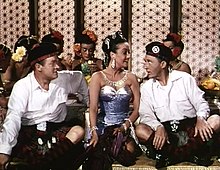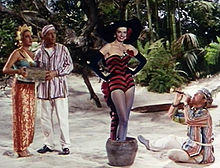Road to ...
This article needs additional citations for verification. (October 2010) |




Road to ... is a series of seven comedy films starring Bing Crosby, Bob Hope, and Dorothy Lamour. They are also often referred to as the "Road" pictures or the "Road" series. The movies were a combination of adventure, comedy, romance, and music. The minimal plot often took a back seat to gags, which appeared improvised but were usually scripted.[1]
Films in the series
- Road to Singapore (1940)
- Road to Zanzibar (1941)
- Road to Morocco (1942)
- Road to Utopia (made in 1943, but not released until 1946)
- Road to Rio (1947)
- Road to Bali (1952)
- The Road to Hong Kong (1962)
- Road to the Fountain of Youth (canceled)
Each film is not simply a comedy, but a satire of some of the popular film genres of the day, including jungle, Arabian nights, Alaskan adventure and high seas.
In 1977, an eighth Road to... movie was planned, titled Road to the Fountain of Youth, but Crosby died that year of a heart attack.[2]
In 1947,
Running gags
This article possibly contains original research. (November 2010) |
Beginning with Road to Singapore the films also included in-joke references to other Hollywood actors and jabs at Paramount Pictures, the studio that released all the films except for The Road to Hong Kong. There are also frequent instances in which Bob Hope breaks the fourth wall to address the audience directly, such as in Road to Bali, in which he says, "[Crosby]'s gonna sing, folks. Now's the time to go out and get the popcorn."[4]
Hope and Crosby would usually play some form of
When confronted by the villain, Hope and Crosby would use a "patty cake" routine before throwing punches, though this would sometimes not work, as in Road to Morocco: "That gag sure gets around, huh?" "Yeah, right back to US!" The only film in the series in which the routine was not used was in Road to Utopia.
Both characters would usually promise to not allow women to interfere with their plans, and both would immediately see a woman and forget that promise. Crosby would almost always get the girl, with the exceptions being in Road to Utopia and Road to Rio (although hypnosis was involved in the latter case).
Hope's character usually would have a nickname with which he would be referred to throughout the film, as in Road to Morocco, when he was called "Turkey", and Road to Zanzibar, in which he was called "Fearless".
Crosby credited writer Barney Dean with standing off-camera and continuously coming up with jokes.[7]
Hope would also break the fourth wall continuously to over-act, often with an upbraiding from Crosby. Hope would then blame his overacting on his attempt to win an
Reception
| Film | U.S. release date | US/Canada theatrical rental
|
|---|---|---|
| Road to Singapore[8] | March 14, 1940 | $1,600,000* |
| Road to Zanzibar | April 11, 1941 | TBD |
| Road to Morocco[9] | November 10, 1942 | $3,800,000 |
| Road to Utopia[9] | February 27, 1946 | $4,500,000 |
| Road to Rio[9] | December 25, 1947 | $4,500,000 |
| Road to Bali[9] | December 25, 1952 | $3,000,000 |
| The Road to Hong Kong[10] | May 23, 1962 | $2,600,000 |
| Total | $20,000,000 | |
*Worldwide
Homages and other influence
- The 1944 Famous Studios Popeye cartoon "We're On Our Way to Rio" is a parody of these films.
- The April 20, 1966 episode of The Danny Thomas Show, titled "The Road to Lebanon," featured Bing Crosby scouting locations in Beirut for a new Road picture without Bob Hope.[11]
- In the 1981 Mel Brooks film History of the World, Part I, on escaping from the Romans, Brooks and co-star Gregory Hines parody the series' "We're off on the road to..." signature song by singing "We're off on the road to Judea, we certainly do get around..."
- The 1985 film Spies Like Us, starring Dan Aykroyd and Chevy Chase, is an homage to the films; Hope makes a cameo as himself in one scene. The phrase "Road to Dushanbe" is uttered several times throughout the movie. Dushanbe is near the ultimate destination of the protagonists.
- The 1987 film Ishtar was envisioned by writer/director Elaine May as an homage to the "Road" series.[12]
- The 1990 They Might Be Giants song "Road Movie to Berlin" references the films in its title.
- The TaleSpin episode "Road to Macadamia" pays tribute to the series, including spoofs on the songs.
- Three episodes of the 1991–1995 animated series Taz-Mania spoofed the Road to.. movies, starring Hugh Tasmanian Devil, Taz's father and a Crosby parody. Taz's uncle Drew would later be introduced, naturally parodying Hope. They featured in the episodes "Road to Taz-Mania," "Return of the Road to Taz-Mania Strikes Back" and "Yet Another Road to Taz-Mania."
- The Duckman episode "Road to Dendron" spoofs the series.
- The 2000 animated film The Road to El Dorado is an homage to the Road movies and contains many popular beats, including creating a distraction before fighting an opponent.
- In the 2001–2003 Disney animated series The Legend of Tarzan, the characters Hugo and Hooft are loosely based on Hope and Crosby (though not in appearance).
- The animated TV series Road to ..." episodes that spoof the original Road pictures, starring Brian and Stewie Griffin: "Road to Rhode Island", "Road to Europe", "Road to Rupert", "Road to Germany", "Road to the Multiverse", "Road to the North Pole", "Roads to Vegas", and "Road to India". In addition, the series' 2009 episode "Spies Reminiscent of Us" is an homage to Spies Like Us, even guest starring Aykroyd and Chase, which in turn was based on the "Road" films.
- The television series Road to Friendship" from September 1, 2018, was paying homage to these films with the episode title and a song by the same name.
- In the 1980s, Eric Idle wanted to make a film called The Road to Mars, but became so frustrated by executive meddling at Hollywood studios that he wrote it as a novel instead.
References
- ISBN 9780316091565
- ^ "The 'Road...' Films of Hope, Crosby and Lamour". h2g2. 2004-10-09. Retrieved 2009-10-25.
- ^ Road to Home is available for free viewing and download at the Internet Archive
- ISBN 1476626928
- ^ One example, from The Road to Rio (1947), involves getting $200 to ride a bicycle across a wire; indeed, the Crosby character makes the deal and the Hope character does the deed; or, rather, half of it: Hope appears to cross halfway, before accidentally setting the circus on fire, at which point Crosby bounces Hope into a waiting wagon with horses, to make their escape to the cruise boat which takes them to Rio de Janeiro.
- ISBN 9781134824366
- ^ Gilliland, John (July 8, 1971). "Pop Chronicles Interviews #133 – Bing Crosby". UNT Digital Library.
- ^ "Which Cinema Films Have Earned the Most Money Since 1914?". The Argus. Melbourne. 4 March 1944. p. 3 Supplement: The Argus Weekend magazine. Retrieved June 25, 2020 – via National Library of Australia.
- ^ a b c d Cohn, Lawrence (October 15, 1990). "All-Time Film Rental Champs". Variety. p. M182.
- ^ "Big Rental Pictures of 1962". Variety. January 9, 1963. p. 13.
- ^ "BING magazine". BING magazine.
- ^ "Elaine May in conversation with Mike Nichols". Film Comment. July–August 2006.
External links
- "The Road to Bali". Internet Archive. Dec 6, 2016.
